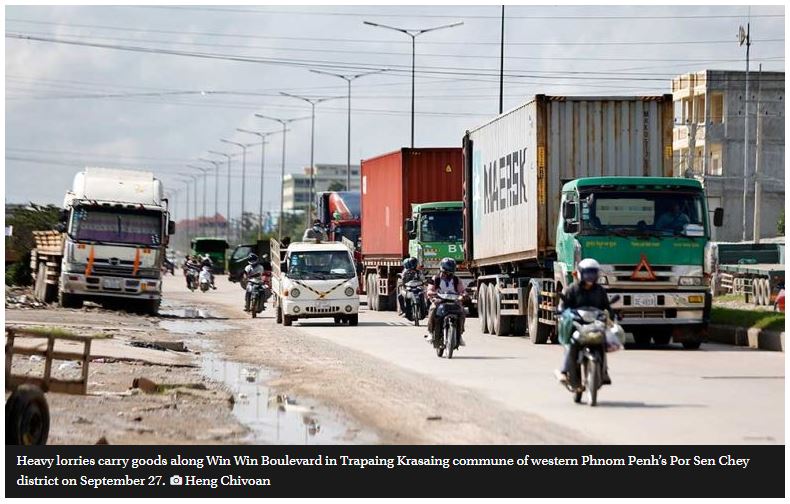Cambodia: Freight rates ‘begin descent’
Freight rates in Cambodia have started to recede gradually as declining international oil prices drive down local retail fuel costs, which will enhance the competitiveness of the Kingdom’s products on international markets, industry insiders have said.
International oil prices have fallen to levels seen in the days prior to February 24 – when Russia began a military offensive in Ukraine – amid growing fears that a looming recession would drastically reduce fuel demand.
At 1057 GMT on August 8, the October contract of Brent futures was at $93.84, down $1.08 or 1.14 per cent from its previous close, while US West Texas Intermediate (WTI) fell to $88.05, with the September contract down $0.96, or 1.08 per cent, according to Investing.com.
In Cambodia, retail fuel prices reached a peak in the June 21-30 period, with regular-grade petrol and diesel at 5,800 riel ($1.43) and 6,300 riel ($1.55) per litre, respectively. These have since dropped by 18.10 per cent and 18.25 per cent to 4,750 riel and 5,150 riel for the August 1-10 period.
Cambodia Logistics Association (CLA) president Sin Chanthy confirmed to The Post on August 8 that a number of transport companies in Kingdom have started to scale back shipping rates, with intent to return to levels seen prior to the Ukraine conflict, for the “benefit of transporters, consumers and other stakeholders”.
Low freight rates not only stimulate domestic and cross-border shipping, but also bring down transportation costs associated with exports, thereby allowing more Cambodian goods to reach international markets.
He shared that many CLA member companies are still considering lowering their shipping rates “in the near future, in line with international oil prices”.
However, providing a dose of realism, Chanthy stressed that a more protracted downtrend is uncertain, given the continued impact of Covid-19 and other global crises.
Similarly, Logistics and Supply Chain Business Association in Cambodia (Loscba) president Chea Chandara views the sustained decline in international oil prices as a “positive sign” for the transport sector and economic growth for oil-importing countries like Cambodia.
Lower oil prices will not only improve travel and transportation, but also cut down costs linked to production such as electricity, and expand export capacity, he explained, echoing Chanthy’s comment that the Ukraine conflict and other international factors make estimating the extent of the ongoing oil price slump difficult.
Nonetheless, a further dip in oil rates and significant improvements in the Covid situation would help revitalise the Cambodian tourism sector, Chandara stressed.
Data by the General Department of Customs and Excise showed that in the first half of 2022, Cambodia’s international trade totalled $27.244 billion or 20.16 per cent more than the corresponding period last year.
Of that, imports grew 11.91 per cent to $15.865 billion, while exports were valued at worth $11.379 billion, up 33.91 per cent. The Kingdom’s trade deficit for the first half narrowed by 21.01 per cent year-on-year to $4.486 billion.
Source: https://www.phnompenhpost.com/business/freight-rates-begin-descent


 Thailand
Thailand




